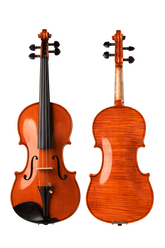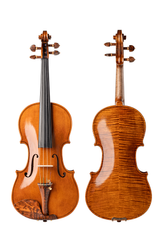Violinist Accessories: A Comprehensive Guide
In addition to a high-quality violin, bow, and sturdy case, what other accessories does a violinist need? This article provides a detailed guide to the essential accessories.

Generally, violinists can be categorized into four levels: beginners, intermediate, advanced, and professional. The requirements for violins and accessories vary among these levels. Therefore, you need to assess your situation and consider upgrading your violin or accessories accordingly.
Essential Accessories for Beginner Violinists
Beginner Level:
This level typically includes those who are just starting and are learning the basics of holding the violin, bowing technique, and producing sound.
If you are a beginner violinist, it's crucial to have a comprehensive set of accessories when starting to learn the violin.
Violin:
Even for beginners, it's advisable to avoid using a cheap violin, as it can be a source of frustration for the player.
Violin Bow:
It's best to start with a bow made of real horse tail hair and wooden construction, rather than synthetic fibers.
Case:
When choosing a case, consider its capacity to accommodate all accessories. Additionally, prioritize sturdiness and weight. For children or students, opt for a sturdy yet lightweight violin case.
Rosin:
Inexpensive dust-free rosin is sufficient. However, if you are allergic to rosin dust, consider purchasing specialized hypoallergenic rosin.
Fingerboard Guide:
Beginners can use fingerboard guides on the violin fingerboard to facilitate practice.
Tuner:
Electronic tuners are convenient; simply clip them onto the violin head. Adjust the mode to 'V,' representing violin tuning. Clip it onto the head, pluck the strings, and ensure the tuner's pointer is in the center. The tuner will also display the letters E, A, D, and G, corresponding to the tuning of the four strings.
Shoulder Rest:
A lightweight and durable plastic or carbon fiber shoulder rest is sufficient. Adjust the rest's size to ensure comfort during use while maintaining the correct playing posture.
Mute:
Attaching a mute to the bridge reduces the violin's volume, minimizing disturbances to others. However, keep in mind that the mute's effectiveness may vary, so it's best to avoid practicing late at night to avoid disturbing others.
Fine Tuners:
Use a tailpiece with four built-in fine tuners for easy tuning.
Polishing Cloth:
A polishing cloth is essential for wiping away rosin dust or sweat from the violin after each use, providing basic maintenance.
With these accessories, beginners can start learning and practicing the violin. If you don't have a violin yet, consider purchasing a beginner violin outfit from Fiddlover Violin Shop, which includes a high-quality violin and all the necessary accessories.
Intermediate Violinist Accessories Guide
Intermediate Level:
At this stage, players have a solid grasp of fundamental techniques and are working on developing more advanced skills such as shifting positions, vibrato, and more complex bowing techniques.
If you are an intermediate violinist, it's time to invest in high-quality accessories to enhance your playing capabilities.
Violin:
The violin remains fundamental, and it's time to upgrade to a better instrument. While you don't necessarily need an expensive violin crafted by a master, opt for a high-quality handmade violin for an improved playing experience.
Bow:
Discard the beginner violin bow and invest in a higher-quality bow. It can significantly enhance your playing experience. Ensure it is handcrafted rather than machine-made.
Rosin:
You can continue using your previous rosin, or consider upgrading to a better one. The impact on the playing experience is minimal at this stage.
Strings:
Opt for high-quality violin strings; a string set will suffice at this stage. Examples include the Thomastik Alphayue Series Violin String Set AL100 or Dominant 135B string set.
Tuner:
You can use smartphone apps, tuning forks, or other tools for tuning, or continue using an electronic tuner. At this stage, you likely have developed your tuning skills, so choose the tool that suits you best.
Fine Tuners:
You can continue using a tailpiece with four built-in fine tuners, but consider transitioning to a tailpiece without fine tuners and installing four metal fine tuners separately. Gradually reduce the use of fine tuners based on your comfort. Professional violinists often use only the E-string fine tuner as additional fine tuners can impact the violin's sound, albeit subtly.
For accessories such as shoulder rest, polishing cloth, and case, you can continue using your existing ones or upgrade to higher-quality and more aesthetically pleasing options. These accessories have minimal impact on the playing experience.
At this stage, you need a balance between quality, enhanced playing experience, and cost considerations. A budget of around $2000 should be sufficient for a comprehensive upgrade. If considering a violin and accessories replacement, check out the intermediate violins for more options. There's certainly a violin you'll love.
Advanced Violinist Accessories Guide
Advanced Level:
Advanced violinists have mastered a wide range of technical and musical skills, demonstrating proficiency and musicality in performing challenging repertoire. At this stage, the pursuit is perfection, eliminating flaws, and ultimately developing a distinctive style to become a professional performer. Therefore, both the violin and accessories require a higher level of quality.
Violin:
When purchasing a violin, understanding the wood, origin, and drying period is crucial for achieving a high-quality sound. If buying online, check for demo videos to select the desired violin. At this stage, you might need multiple violins, as different styles can offer varied playing experiences, helping you define your musical path.
Bow:
Consider bows crafted from Pernambuco wood for a significant improvement in both elasticity and resilience. Communicate with sellers about the possibility of customizing bows, such as adjusting the number of bow hairs or changing the frog and other components. Fiddlover Violin Shop supports bow customization.
Rosin:
Experiment with various brands of rosin at this stage to find the one that best suits your playing. Even subtle differences should be noticeable now, enhancing your ability to discern nuances that may have gone unnoticed before.
Case:
Durability and aesthetics become priorities. With a more expensive violin, the case needs to provide superior protection. Considering frequent performances, an appealing exterior is also essential.
Humidifier or Desiccant:
Maintain a comfortable environment for storing the violin. Typically, store it in the case at room temperature with humidity between 40%-60%. You can use a humidifier or desiccant to regulate humidity. Avoid exposing the violin or placing it in extreme conditions.
Strings:
Based on your experience, experiment with replacing one or more strings. At this stage, try various types and brands of strings to adjust and pursue the desired sound.
If you're looking to purchase a violin at this stage, check out Fine Violin. Each product is sold individually, and what you see is what you get, with demo videos available for each violin.
Professional Violinist Accessories Guide
Professional Level:
Professional violinists have attained the highest level of skill and artistry, often performing as soloists, in chamber ensembles, or as members of professional orchestras. At this stage, you likely have a clear direction regarding accessories and violins. If you need to purchase a violin or bow, feel free to contact us for personalized recommendations based on your preferences.
In Conclusion:
In summary, choose accessories and violins based on your specific needs and preferences. There's no such thing as the perfect violin—only the one that suits you best. We hope every violinist finds the perfect violin and accessories tailored to their unique style and requirements.





